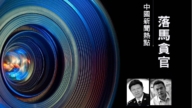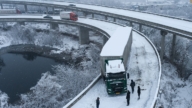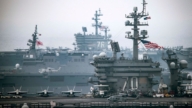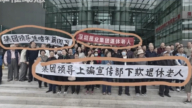【新唐人2012年1月31日訊】今年的龍年被外界普遍認爲是中共特別的「政治年」,因為中共為了保證十八大政權交接順利,外界觀察,經濟也將會服從於政治。有媒體發表社論,分析了中共在龍年所面臨的政治難題和經濟難題。評論認為,中共龍年的難題是內政。
《世界新聞網》27號的社論指出:中國的經濟從來就與政治密不可分,今年外部有「中國崩潰論」,內部則是「硬著陸」或「軟著陸」到來的老調。
文章分析,龍年的中國,經濟進入了一個新的週期,這個週期有三個基本態勢,一是刺激性擴張政策全面退出、經濟回歸階段;一是持續的通貨膨脹壓力減退,但內部 物價仍在高位,外部仍有輸入型通膨的風險;三是經濟成長減速,因實體經濟受困而有失速的壓力。因此,今年是中國經濟關鍵的一年,而關鍵中的關鍵,是看經濟能否實現「軟著陸」。
社論還指出,今年因內外經濟變局,中共面臨各方面問題風險加大的危機,包括經濟失速的風險、通脹再襲的風險、金融危機的風險、社會矛盾的風險等等,特別是在金融領域,防風險實際已成頭等大事。
而由於宏觀調控的變化,經濟轉型的壓力,在財稅體制,在房地產、收入分配等領域的壓力,極有可能導致矛盾的加劇和爆發。
至於政治週期上,社論認爲,中共目前面臨最大的難度,是國際間選舉的變局。除台灣大選完成,與中國關係密切的美國、俄羅斯等大國也有大選,有的會對中共的政治週期產生直接影響。
美籍華人評論作家曹長青在《自由亞洲電臺》評論表示,今年全世界一連串的國家領導人選舉,都更凸顯中國的落伍。沒有選舉,沒有新聞自由,人為決定國家領導人。這種現狀能長久的持續下去嗎?
香港《動向》雜誌主編張偉國向《新唐人》表示,中國的一黨專制,除非像「辛亥革命」或「中東茉莉花革命」,是從外部改變政局,否則, 中共內部不會主動改變。
張偉國:「實質上,權貴資本主義被利益集團綑綁,或者它與世界主流文明為敵,這樣一個基本的態勢不會變,主觀上來講,共產黨自己不會變,要變也是客觀、外界的壓力,迫使它不得不變。」
中國沒有選舉,早就欽定了習近平接班。曹長青認為,習近平上臺後,一般估計會延續胡錦濤的政策,但從習近平的言行來看,他可能會更傾向毛澤東時代的那種意識形態,會更加左傾。但這樣做法將會加劇中國社會的矛盾,增加政局的不穩定性,激發中國社會重大變遷的提前到來。
張偉國:「包括現在權貴資本主義在中國的發展,整個人類文明的一些基本準則,包括一些人權的異憲,都受到挑戰。」
此外,《世界新聞網》26號發表的另一篇社論指出,中共政府在龍年來臨之際,面臨國內乃至海外華人社區的質疑和批評,指中共的外交政策太過軟弱,太過逢迎,在南海爭端上不敢「亮劍」,在日本問題上更是縮手縮腳,甚至要邀請皇太子訪華,網民的批判聲越來越大,給中共政府的決策帶來重大壓力。
因此,社論認爲,中共今天的主要問題,不是外交,而是內政。中共的內部矛盾,尤其是貪污腐敗、法制不彰、社會不公、分配不均,都找不到解決問題的出路。於是,就造成了人才外流、金錢外流的傾向。而一個很諷刺的現象是,一方面,中共當局和民眾對美國和西方國家的批評加劇,另一方面,移民、留學美國和西方;資產 轉移到美國和西方的現象,卻方興未艾。
新唐人記者周玉林、周平、蕭宇採訪報導。
CCP’s Challenges In 2012
The 2012 Chinese Year of Dragon is believed to be a special
“political year" for the Chinese Communist Party(CCP).
As the CCP tries to ensure a smooth hand over of its political
power at the incoming 18th Congress.
Outside comments believe the CCP will place the economy
at a lower priority to politics.
Media analyzed the difficulties in politics and economy that
the CCP regime faces in 2012.
The reviews say the CCP’s challenge in 2012 is
internal affairs.
On Jan 27, an editorial in Worldjournal.com said that China’s
economy has always been inseparable to politics.
In 2012, the regime faces “China Collapse" talk from outside,
and the tune of “hard landing" or “soft landing" from within.
The article analyzed that China’s economy has entered
a new cycle this year, presenting three basic trends.
1. economic regression and withdrawal of expanding
stimulus policy.
2. cooling of continual inflation, yet domestic prices remain
high, and a risk of imported inflation;
3.economic slowdown, and stall pressure that may stem
from in-trouble entity economy.
2012 is deemed a critical year for China’s economy.
The crux is whether the economy will achieve a “soft landing".
The editorial noted that due to economic changes at home
and abroad, the CCP regime faces increased risks in 2012.
The crises involve various aspects, including economic stall,
inflation comeback, financial crisis, social conflicts, etc.
Risk prevention is a top priority, especially in the
financial sector.
Factors that will likely lead to outbreaks or escalation of
conflicts may come from many areas.
Changes of macro-control policies, pressures from economic
restructuring, real estate, and from income distribution.
The biggest political issue that the CCP currently faces is
unexpected changes on worldwide elections, the editorial said.
After the finish of Taiwan’s presidential election, the U.S.,
Russia and other major countries will hold individual elections.
The elections of these nations, who hold close ties with China,
are expected to directly impact the CCP’s political cycle.
Cao Changqing, Chinese-American writer and critic, reviewed
the issue via Radio Free Asia.
A series of national elections will be held in the world in 2012,
highlighting China’s outdated system, Cao said.
No elections, no freedom of press, man-induced decisions
to produce head of state.
Cao asked, will the status quo continue to last much longer?
Zhang Weiguo, Chief Editor of Hong Kong’s Trend magazine,
thinks only changes outside can change the political status.
CCP dictatorship can only be changed in approaches like
1911 Chinese Revolution or Middle East Jasmine revolution.
The CCP will not proactively change from within.
Zhang Weiguo: “In essence, crony capitalism is tied by
interest groups.
It remains hostile to global mainstream civilization.
I think such a basic situation won’t change.
Subjectively speaking, the CCP itself won’t change.
If it changed, that would be under pressures from outside,
forcing it to make an unwilling change."
China has not yet held elections, Xi Jinping was anointed
as CCP Presidential successor.
Cao Changqing expected Xi will follow Hu Jintao’s policy.
Yet Xi’s words and deeds reflect Maoist ideology.
If Xi were more Leftist inclined, that would aggravate China’s
social conflicts and increased political instability.
Major changes in Chinese society might be expected to
arrive earlier.
Zhang Weiguo: “The crony capitalism existing in China,
some basic human civilization norms, are all being challenged."
On Jan 26, another editorial on Worldjournal.com said that
the CCP faced questions and criticism at home and abroad.
On the eve of Chinese New Year, the CCP regime was
accused of too-weak and too-flattery foreign policy.
And not dare to fight it out over the South China Sea dispute.
The public criticized the regime’s over-timid ness on
China-Japan territory issues.
It even invited Japan Crown Prince to visit China.
Growing netizens’ criticism has brought great pressure
on the CCP regime’s decision.
In conclusion, the editorial said CCP’s current leading
question is not foreign policy, but civil affairs.
The CCP faces irresolvable internal contradictions.
Especially corruption, the legal system failing to work,
social injustice, unequal distribution, and the like.
In this case, there is a trend of intellectuals moving abroad,
as well as money and assets being transferred abroad.
Ironically, criticism from the CCP regime and the public is
increasing.
NTD reporters Zhou Yulin, Zhou Ping and Xiao Yu




























